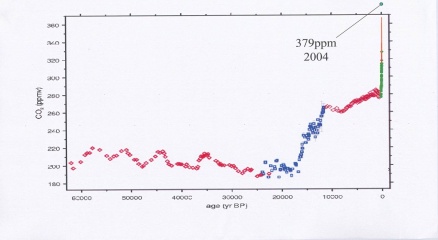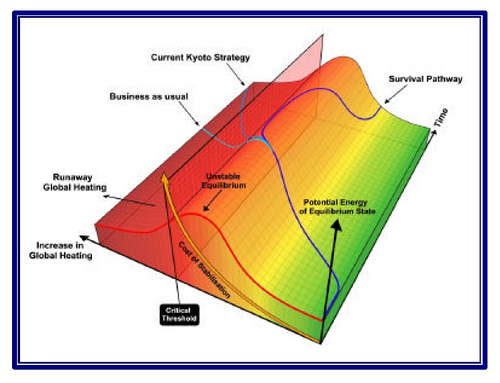Difference between revisions of "Climate Portal"
Miriam Rose (talk | contribs) |
Miriam Rose (talk | contribs) m |
||
| Line 71: | Line 71: | ||
The conference was significant as it was scheduled to come up with the next binding agreement after the first stage of the Kyoto protocol expires in 2012. In the largest climate demonstrations to date over 100,000 people protested in Copenhagen, putting pressure on governments to achieve tough and legally binding carbon descent targets, highlighting the ineffectiveness of the Kyoto targets, which are far from being met by most states. Meanwhile the conference was slammed for turning away even mainstream NGOs such as [[Friends of the Earth]] and [[Avaaz]] as many registered civil society [http://www.spinprofiles.org/index.php/UK_Participants_and_Observers_at_COP15 participants and observers] were prevented from attending, leading to accusations of elitism and a denial of democracy <ref>John Vidal and Jonathan Watts [http://www.guardian.co.uk/environment/2009/dec/16/friends-of-the-earth-barred-bella-centre | The conference was significant as it was scheduled to come up with the next binding agreement after the first stage of the Kyoto protocol expires in 2012. In the largest climate demonstrations to date over 100,000 people protested in Copenhagen, putting pressure on governments to achieve tough and legally binding carbon descent targets, highlighting the ineffectiveness of the Kyoto targets, which are far from being met by most states. Meanwhile the conference was slammed for turning away even mainstream NGOs such as [[Friends of the Earth]] and [[Avaaz]] as many registered civil society [http://www.spinprofiles.org/index.php/UK_Participants_and_Observers_at_COP15 participants and observers] were prevented from attending, leading to accusations of elitism and a denial of democracy <ref>John Vidal and Jonathan Watts [http://www.guardian.co.uk/environment/2009/dec/16/friends-of-the-earth-barred-bella-centre | ||
| − | 'Friends of the Earth among activists barred from Copenhagen conference centre'] The Guardian, Wednesday 16 December 2009. Accessed 16/01/10</ref>. The ultimate failure of the conference to reach any effective agreement is is also being hailed as historically important as it is seen by some to signify the end of hope in top-down government and business led climate change strategy. Lumumba Di-Aping, chief negotiator for the G77 group of 130 developing countries, called the conference outcome 'nothing short of climate change scepticism in action', adding 'It locks countries into a cycle of poverty for ever'. <ref>John Vidal, Allegra Stratton and Suzanne Goldenberg [http://www.guardian.co.uk/environment/2009/dec/18/copenhagen-deal 'Low targets, goals dropped: Copenhagen ends in failure'] Saturday 19 December 2009.</ref> | + | 'Friends of the Earth among activists barred from Copenhagen conference centre'] The Guardian, Wednesday 16 December 2009. Accessed 16/01/10</ref>. |
| + | |||
| + | The ultimate failure of the conference to reach any effective agreement is is also being hailed as historically important as it is seen by some to signify the end of hope in top-down government and business led climate change strategy. Lumumba Di-Aping, chief negotiator for the G77 group of 130 developing countries, called the conference outcome 'nothing short of climate change scepticism in action', adding 'It locks countries into a cycle of poverty for ever'. <ref>John Vidal, Allegra Stratton and Suzanne Goldenberg [http://www.guardian.co.uk/environment/2009/dec/18/copenhagen-deal 'Low targets, goals dropped: Copenhagen ends in failure'] Saturday 19 December 2009.</ref> | ||
The increase in public denial and disillusionment about climate change in Britain may also be seen as a manifestation of hopelessness and apathy about finding solutions to the issue, perpetuated by ineffective government strategies, which have historically targeted individual behaviour over polluting industry. Only 41% of those surveyed by a recent Times newspaper poll believed climate change was anthropogenic (man made) despite established science to the contrary. <ref>Ben Webster and Peter Liddell, The Times, November 14,2009. 'Global warming is not our fault, say most voters in Times poll'</ref> | The increase in public denial and disillusionment about climate change in Britain may also be seen as a manifestation of hopelessness and apathy about finding solutions to the issue, perpetuated by ineffective government strategies, which have historically targeted individual behaviour over polluting industry. Only 41% of those surveyed by a recent Times newspaper poll believed climate change was anthropogenic (man made) despite established science to the contrary. <ref>Ben Webster and Peter Liddell, The Times, November 14,2009. 'Global warming is not our fault, say most voters in Times poll'</ref> | ||
Revision as of 16:10, 16 January 2010
Welcome to the Climate Portal on Spinprofiles | |||
|---|---|---|---|
|
|
|
References
- ↑ IPCC, Climate Change 2007: Synthesis Report, accessed 11th September 2009
- ↑ IPCC, Climate Change 2007: Synthesis Report, accessed 11th September 2009
- ↑ IPCC, Climate Change 2007: Synthesis Report, accessed 11th September 2009
- ↑ John Vidal and Jonathan Watts [http://www.guardian.co.uk/environment/2009/dec/16/friends-of-the-earth-barred-bella-centre 'Friends of the Earth among activists barred from Copenhagen conference centre'] The Guardian, Wednesday 16 December 2009. Accessed 16/01/10
- ↑ John Vidal, Allegra Stratton and Suzanne Goldenberg 'Low targets, goals dropped: Copenhagen ends in failure' Saturday 19 December 2009.
- ↑ Ben Webster and Peter Liddell, The Times, November 14,2009. 'Global warming is not our fault, say most voters in Times poll'
- ↑ Helene Cooper, The New York Times, 14th Nov 2009. 'Leaders Will Delay Deal on Climate Change'


